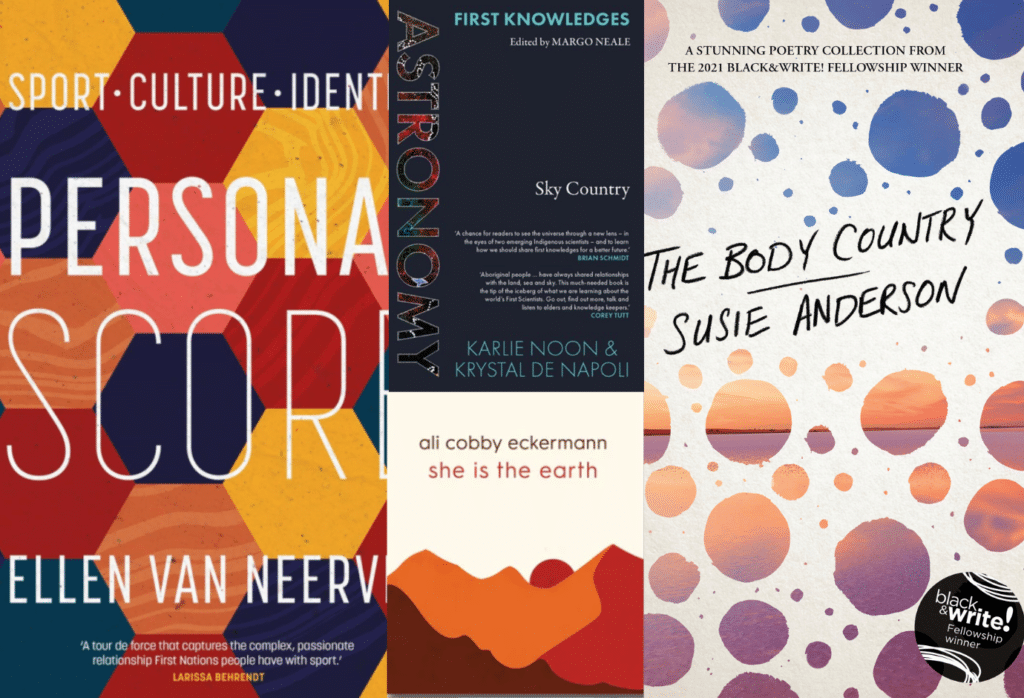In the last 12 months, several First Nations authors have released new works – many of them to great acclaim.
Here, we take a look at our top five favourites, and encourage you to go out and buy yourself a copy.
Ellen van Neerven – Personal Score: Sport, culture, identity
Award-winning First Nations author, Ellen van Neerven is one of the most prolific and celebrated poets working in Australia today.
As a person of Mununjali and Dutch heritage, their first book, Heat and Light was the recipient of the David Unaipon Award, the Dobbie Literary Award and the NSW Premier’s Literary Awards Indigenous Writers Prize.
In their latest collection of essays, blending poetry and memoir, the self-proclaimed “armchair enthusiast of soccer” asks “What does it mean to play sport on First Nations land?”
Through personal anedcotes and beautifully exacting prose, van Neerven explores our country’s relationship with sports, race, gender and sexuality.
Pondering the book in a recent piece published by The Conversation, Professor of Indigenous Health at Queensland University of Technology, Chelsea Watego described the book as “a beautiful story of Blackfulla love – for sport, for Country. Most importantly, it’s a story of finding love for ourselves.”
Van Neerven is also teaching a masterclass on writing for First Nations writers later this year at Varuna, in the Blue Mountains. You can find out more information here.
Find Personal Score: Sport, culture, identity here.
Susie Anderson – The Body Country
Since 2011, the State Library of Queensland has teamed up with Australian Council for the Arts, Hachette Australia and Magabala Books to award two writing Fellowships to Aboriginal or Torres Strait Islander writers with an unpublished manuscript.
The black&write Fellowships give the recipients time and money to assist them with manuscript development, and a publishing opportunity at the end of their project.
Wergaia and Wemba Wemba woman, Susie Anderson won the fellowship in 2021, with her poetry manuscript called The Body Country — which will be published later this month by Hachette.
The collection examines her relationship to land, identity, memory, love and art. On her website, Anderson describes the book as “an essay…which reflects on how the self is crafted through experience, memory and identity…[and] threaded through the poetry collecting…that span over the past 10 years.”
In her 2020 editorial note for Cordite Poetry, she described poetry as “a living thing: conversations around this journal taught me grace, humility, compassion and openness.”
The Melbourne-based digital producer has been writing for publications including Archer, Artist Profile, Artlink, un magazine. She was also included in the popular anthology, “Growing Up Aboriginal in Australia” which was published by Black Inc. in 2018 and has since become a core text in the VCE curriculum.
Find The Body Country here.
Ali Cobby Eckermann – She is the Earth
Yankunytjatjara/Kokatha poet and artist Ali Cobby Eckermann has been working in South Australia for many decades, developing collections across multiple disciplines. She made international headlines in 2017 when she was awarded the major US literary prize, Windham-Campbell, worth $215,000, which is given to a writer who is unaware they are even in the running.
Her poetry has been published in prestigious international journals including The Poetry Foundation, and her collections, “little bit long time” and “Inside My Mother” have won many literary awards.
Known for her visceral poetic style, Eckermann’s latest verse novel is a taut 96-page powerhouse examining the weight of grief and celebrates the healing power of Country. In her review of the work, author Sian Cain described the collection as one that “…feels both dreamlike and visceral, the talented poet making a nebulous plane of existence feel miraculously tangible…[it is] beautifully metaphysical…charts this journey of sound, light, rock and sea; we witness the creation of Country.”
Find She is the Earth here.
Ruby Langford Ginibi – Don’t Take Your Love To Town
This year, the University of Queensland Press have released fresh new editions of modern First Nations classics, including Jeanine Leane’s “Purple Threads”, Herb Wharton’s “Unbranded” and Tony Birch’s “Blood”.
Ruby Langford Ginibi’s seminal work of Indigenous memoir, “Don’t Take Your Love To Town” is also among the collection — a powerful story of courage, grief and resilience faced by a young woman.
Originally published in 1988, the book was the first of five autobiographies that Ginibi published over her three-decade long career.
In an essay written released in conjunction with the new release, the Miles Franklin winner and Wiradjuri writer,Tara June Winch wrote that “Decades later [the book] retains its relevance and importance, still sounding a clarion call to the future for understanding and a breaking of the cycle of social and racial disadvantage for Aboriginal Australians, at long last.”
This latest edition includes an Introduction by Yuwaalaraay artist and writer Nardi Simpson.
Find Don’t Take Your Love To Town here.
Karlie Noon, Krystal De Napoli – First Knowledges Astronomy: Sky Country
“Everything is connected and everything and everyone has a place. I knew these words were the truth from the day I was born.”
Thus begin’s Karlie Noon’s introduction on her personal perspectives in the book she co-authored with fellow astrophysicist and First Nations writer, Gomeroi woman Krystal De Napoli.
In six, concise and informative chapters, both scientists take readers through a journey rooted in the celebration of Indigenous ways of knowing, and of understanding the night sky.
With clarity, poise and insight, the authors delve into the contextually significant and practical knowledge held by First People, as well as Torres Strait Islanders’ intimate astronomical knowledge, technical aspects of planetariums, and ways of keeping these important knowledges alive.
Find First Knowledges Astronomy: Sky Country here.


